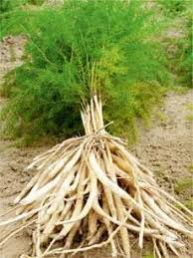
Shatavari Plant
Asparagus is the Greek word for “stalk” or “shoot”. About 300 species of Asparagus are known to occur in the world. The Asparagus genus is considered to be of medicinal importance because of the presence of steroidal saponins and sapogenins in various parts of the plant. Out of several species of 'Asparagus' grown in India, A. racemosus, A. gonaclades and A. adsendens are most commonly used in indigenous medicine. A. racemosus is commonly mentioned as a rasayana in the Ayurveda. Rasayanas are those plant drugs which promote general well being of an individual by increasing cellular vitality or resistance. Beneficial effects of the root of A. recemosus are suggested in nervous disorders, dyspepsia, diarrhoea, dysentry, tumors, inflammations, hyperdipsia, neuropathy, hepatopathy, cough, bronchitis, hyperacidity and certain infectious diseases. A study of ancient classical Ayurvedic literature claimed several therapeutic attributes for the root of A. racemosus (Hindi:-Shatavari) and has been specially recommended in cases of threatened abortion and as a galactogogue. Root of A. racemosus has been referred as bitter-sweet, emollient, cooling, nervine tonic, constipating, galactogogue, aphrodisiac, diuretic, rejuvenating, carminative, stomachic, antiseptic and as tonic.
...moreBe first to Rate
Rate This